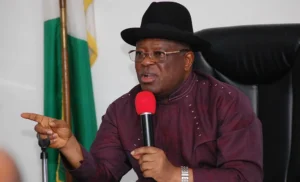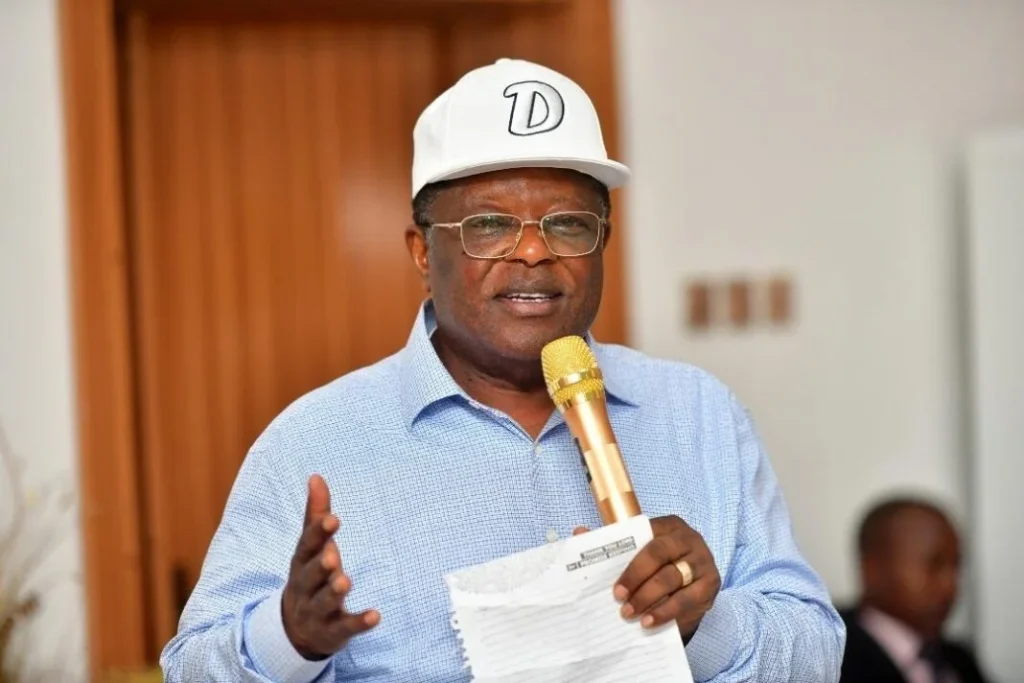In a landmark verdict that sent ripples through Nigeria’s political arena, a Federal High Court in Abuja ruled that Governor Dave Umahi of Ebonyi State and his deputy, Eric Kelechi Igwe, must vacate their offices following their defection from the Peoples Democratic Party (PDP) to the All Progressives Congress (APC). The judgment, delivered in March 2022, stirred fresh debate over the legality of political defections by elected officeholders and their implications for democratic accountability.
Justice Inyang Ekwo, who presided over the case, stated unequivocally that Umahi and his deputy could not retain their positions after abandoning the political platform under which they were elected. The court held that their mandate belonged to the PDP and not to them as individuals.
Defection Without a Fresh Mandate Is Unconstitutional, Says Court
The core argument in Justice Ekwo’s ruling centered on the sanctity of electoral mandates. According to the judgment, “Votes cast during an election are for political parties, not for candidates individually.” Therefore, once a candidate defects to another party without a compelling constitutional justification, their mandate is deemed to revert to the party that sponsored their election.
The judge added, “There is no constitutional provision that allows an elected governor or deputy to defect from the political party that sponsored them and still retain their seat.” He emphasized that such acts undermined the democratic process and encouraged political opportunism.
In line with the court’s directive, the Independent National Electoral Commission (INEC) was ordered to cease recognizing Umahi and Igwe as the Governor and Deputy Governor of Ebonyi State, respectively. The PDP was instructed to nominate suitable replacements or allow INEC to conduct fresh elections.

Background: Umahi’s Switch to APC Draws Controversy
Governor Umahi officially dumped the PDP for the APC in November 2020, citing alleged marginalization of the Southeast region by the opposition party. He claimed that his defection was in the interest of his people and aimed at positioning the Southeast more strategically in national politics.
However, critics viewed the move as politically motivated and self-serving. They argued that the timing of the defection—midway through his second term—betrayed a lack of loyalty to the platform that had twice secured his election. PDP leaders, angered by what they described as betrayal, vowed to challenge the legality of his continued stay in office.
The party promptly filed a lawsuit against Umahi and Igwe, seeking their removal on grounds of constitutional breach and usurpation of a party’s mandate.
Legal Significance and Precedent-Setting Nature of the Judgment
The court’s decision marked the first time in Nigeria’s political history that a sitting governor was sacked purely on the basis of party defection. While legislators had previously been removed for similar reasons, state governors had largely escaped such consequences due to legal ambiguities.
Legal analysts hailed the ruling as a bold interpretation of the constitution, one that could redefine the limits of political defection and reinforce the principle of party supremacy in electoral matters. It also raised the stakes for politicians contemplating midterm switches, potentially deterring future defections unless backed by credible justification.
Though the constitution allows freedom of association, the court maintained that such freedoms do not extend to altering the outcome of elections without due process.
Governor Umahi Reacts, Describes Verdict as ‘Ridiculous’
Reacting to the ruling, Governor Umahi expressed strong disapproval and described the judgment as a miscarriage of justice. Speaking during a press conference shortly after the verdict, he stated, “This is a black market judgment. I am still the governor of Ebonyi State, and nobody can remove me from office.”
He accused the presiding judge of acting on political motivations rather than sound legal reasoning and vowed to appeal the decision immediately. Umahi insisted that he had not committed any constitutional offense that warranted removal from office and urged his supporters to remain calm.
His deputy, Eric Igwe, echoed similar sentiments, stating that the judgment would not stand on appeal and expressing confidence in the higher courts to overturn the ruling.
PDP Celebrates Legal Victory, Calls for Swift Implementation
The Peoples Democratic Party hailed the court’s decision as a triumph for constitutional order and a warning against political opportunism. In a statement issued shortly after the verdict, the PDP National Working Committee (NWC) called on INEC to comply swiftly with the court’s directive and initiate steps to fill the vacated positions.
According to the PDP, “This judgment validates our stand that mandates belong to parties, not individuals. No elected official should feel entitled to retain a seat after betraying the party’s trust.”
The party assured Ebonyi residents of its readiness to provide continued leadership and transparency through whichever means the law prescribed—either by nominating a replacement or through fresh elections.
Broader Implications Across Nigeria’s Political Spectrum
The judgment sparked widespread discussion among political stakeholders, legal experts, and civil society groups. While some hailed it as a necessary corrective to the growing culture of political defections, others warned of potential overreach, arguing that Nigeria’s current constitution does not clearly outline penalties for governors who defect.
Opposition parties celebrated the development as a check on what they saw as APC’s aggressive poaching of politicians, while the ruling party described the judgment as troubling and vowed to challenge it through the appellate court system.
In states like Cross River, Benue, and Zamfara—where similar defections by governors had occurred—pressure mounted on opposition parties to initiate similar legal battles.
Next Steps: Appeal, Political Uncertainty, and Legal Debate
Governor Umahi and his legal team filed a notice of appeal at the Court of Appeal shortly after the verdict. As the legal process unfolded, INEC refrained from taking immediate action, citing the need for legal clarity and respect for the appellate process.
The uncertainty left Ebonyi State in a state of limbo, with questions lingering over who held the legitimate mandate. Political watchers noted that the final outcome of the appeal could either reinforce or completely overturn the lower court’s precedent.
Regardless of how the case concludes, the ruling has already shifted the dynamics of political accountability in Nigeria, sending a clear message that electoral mandates must be respected.
Conclusion: A Turning Point for Party Loyalty and Constitutional Interpretation
The Federal High Court’s decision to remove Governor Dave Umahi and his deputy from office over their defection to the APC represents a watershed moment in Nigeria’s democratic evolution. Whether upheld or reversed on appeal, the judgment underscores a growing demand for political fidelity and constitutional discipline among elected officials.
It may well shape how politicians approach party affiliations going forward—and redefine the boundaries of political loyalty in Nigeria’s multiparty democracy.






